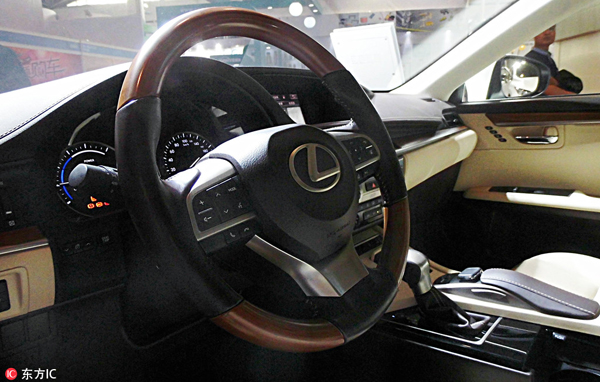 |
|
The interior of a vehicle on display at an auto expo in Beijing, April 28, 2016. [Photo/IC] |
The auto industry's self-driving revolution has spurred the biggest two years of car-supplier takeovers in a decade, with more coming as parts makers struggle to keep up with the pace of technological transformation.
The total value of automotive-supplier deals in 2015 and 2016 was $74.4 billion, according to data compiled by Bloomberg, with each of those years far exceeding the $17.7 billion annual average in the previous 10 years. The number of transactions valued at $500 million or more also skyrocketed to 18 last year, triple the level of the previous decade. There have been 11 such deals so far this year.
The driving force behind the wave of consolidation is the pressure to keep up with the shift towards autonomous driving that started about five years ago. Suppliers need the know-how to help cars see their environment, which means sensors and cameras, plus the computing power to comprehend the waves of data and share some of it, like traffic conditions, from vehicle to vehicle.
Meanwhile, parts makers are getting cheaper, with economic uncertainty and Brexit concerns driving share prices down.
"Automotive bankers are definitely spending more time in places like Silicon Valley," said Christian Kames, Citigroup Inc's head of investment banking for Germany, Austria and Switzerland, and the global co-head of automotive. "The focus areas are electronics, communications and software."
Infotainment next
Up next could be deals in infotainment, which would give parts makers access to the all-important interface between driver and vehicle. With a number of smaller players, the sector is attractive because combinations probably would not raise the concern of competition regulators, said Chris McNally, a London-based analyst at Evercore ISI.
ZF Friedrichshafen AG, Continental AG and Robert Bosch GmbH have relatively little exposure to infotainment, he said. se
The week before last week's slate of deals shows where the industry is headed. ZF, fresh off last year's $12.9 billion purchase of TRW, the industry's biggest in eight years, took a 40 percent stake in radar supplier Ibeo Automotive Systems GmbH and bid 4.41 billion kronor ($515 million) on Aug 4 to win brake-maker Haldex AB away from German competitor SAF-Holland SA. The day before, Samsung Electronics Co was said to be in advanced talks to buy some or all of auto parts-maker Magneti Marelli from Fiat Chrysler Automobiles NV in a potential $3 billion deal. This would be Samsung's first automotive purchase.
Buy now
"If you don't buy now, and boost your capabilities for autonomous driving and for connected cars, there's no second chance, because others will," said Dietmar Ostermann, who leads an annual study of supplier deals as director of the automotive practice at PWC.
China rush
In addition to the rush to acquire technology, increased appetite from China is driving deals, according to bankers. For example, Ningbo Joyson Electronic Corp, a Chinese supplier to several of the world's largest automakers, agreed in February to buy US airbag maker Key Safety Systems for $920 million.
"The targets for my clients sit in Silicon Valley, while the buyers for my clients are in China," said Axel Hoefer, managing director at Goldman Sachs Group Inc., Frankfurt.
Autonomous functions will take a leap forward in the next few years. BMW AG is working with chipmaker Intel Corp and camera-software company Mobileye NV to bring a car to the road by 2021 that can cruise highways autonomously. Volvo Car Group is promising the same. Continental, Europe's second-biggest car-parts supplier, is working on its own BMW-style cooperation.
The industry's profit expectations for shared self-driving cars have helped make ride-sharing provider Uber Technologies Inc, which is testing autonomous vehicles in Pittsburgh, the world's most valuable startup, worth about $62 billion.
As the sector shifts from supplying car seats and exhaust pipes to offering camera software and sensors, new entrants like Samsung will speed the rate of change. At the same time, companies that are not profitable enough to keep up could be snapped up by larger competitors looking to grow while saving costs as well as setting up a better negotiating position with automakers.
"If a company isn't innovative and its products aren't unique, they won't survive in the shark tank that is the auto supply sector," said Peter Fuss, a partner at EY's automotive advisory unit.
Bloomberg
